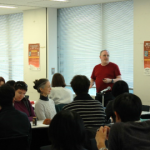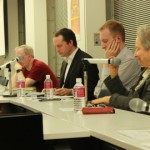“The Power of Translation: Who’s Afraid of Poetry” Report
On November 15, 2019, lectures and a workshop with the theme “The Power of Translation: Who’s Afraid of Poetry?” took place under the sponsorship of the Transdisciplinary Research for Creative Writing and Translation Research Area of Waseda University Research Institute for Letters, Arts and Sciences (RILAS) and the co-sponsorship of the Top Global University Project Global Japanese Studies Model Unit. The proceedings began with opening remarks by the head of the RILAS research area, followed by an explanation of the purpose of the event by the moderator and Part 1 of the event, which consisted of lectures by Thomas McAuley, who produced a then soon-to-be-published translation of The Poetry Contest in Six Hundred Rounds, and Janine Beichman, who is known in the world of Japanese poetry translation for her work involving Yosano Akiko and others.
In the first lecture, McAuley presented the problem that lies at the foundation of translation: whether translators should translate texts from other cultures in a manner that draws them closer to the cultural sphere of the readers (domestication), or whether they should translate in a manner that retains the otherness of the cultural spheres that gave rise to the texts (foreignization). He noted that, in the case of translating classical literature, there is the additional difference of the gap between the pre-modernity in which a text arose and the present-day culture to which readers belong. Having thus set the question to explore, McAuley carefully introduced and discussed—based on specific examples of English translations—issues that translators of classical waka poems face, including the five-seven-five-seven-seven format, the double meanings produced by devices such as utamakura and kakekotoba, and the intertextuality seen in honkadori. Simultaneously, the discussion of these issues served to underscore how the work of translation could make those attending the lecture feel more vividly the intricacy and richness of the literary genre of waka, thus ultimately making a strong argument for the power of translation.
- Assistant Prof. McAuley
- Prof. Emerita Beichman
Next, Beichman discussed several works from Yosano Akiko’s poetry collection Sahohime that Beichman herself had translated. Frequently mentioning points that McAuley had made, Beichman presented real-life examples of the kinds of judgment calls and decisions that must be made during the actual translation process. She discussed the difficult tasks involved, ranging from the selection of the vocabulary used to compose the translation to methods of dividing lines of the poetry being adapted—as well as how to capture in translation the visual effect of the artfully scattered characters of varying thicknesses and styles that characterize the chirashigaki layouts in which classical Japanese poetry was written. The audience was also greatly impressed by Beichman’s discussions of going through the detailed process of polishing and revising her translations, which demonstrated how the act of producing excellent translations necessarily entails an act of profoundly intricate interpretation.
Commentary by Michael Watson had been planned to follow the presentations by the two translators, but Watson had been unexpectedly hospitalized before he could attend the event in person. Thus, the commentary ended up consisting of video pre-recorded by Watson in the facility where he was being treated and based on the lecture materials provided to him. Grounding his commentary on the contents of the two lectures, Watson discussed McAuley’s talk, mentioning the effects of one’s physical and mental condition on how one receives translations. Watson also referenced additional examples of translations to reinforce and add further depth in response to the issue posed of the number of lines in which to produce translations of poetry. Concerning Beichman’s lecture, Watson expanded on the issue posed of the formatting of translated texts by touching on the possibilities for expression that electronic media provide. By developing upon points raised in the lecture such as the issue of the imagery evoked by the sounds of text, Watson’s commentary provoked numerous suggestions.  Afterward, following a break, the event transitioned to Part 2, which consisted of a workshop comprising a translation contest and a discussion. One of the organizers of the event, Machiko Midorikawa—who also served as moderator—had come up with the idea of taking the concept of uta-awase, poetry competitions that have been held since antiquity, and applying it to the translation of traditional Japanese poetry, a unique experiment that, to our knowledge, was without precedent. Specifically, Loren Waller presented waka pieces, and Andrew Houwen presented tanka pieces, as works to serve as translation prompts in the fashion of odai subject prompts used in imperially sponsored poetry competitions. Undergraduate students affiliated with the Global Studies in Japanese Cultures Program (JCulP) took these prompts and submitted draft translations of them. After supplementary explanations, the prompt-givers provided commentary and then interpretations with aid of their own translations.
Afterward, following a break, the event transitioned to Part 2, which consisted of a workshop comprising a translation contest and a discussion. One of the organizers of the event, Machiko Midorikawa—who also served as moderator—had come up with the idea of taking the concept of uta-awase, poetry competitions that have been held since antiquity, and applying it to the translation of traditional Japanese poetry, a unique experiment that, to our knowledge, was without precedent. Specifically, Loren Waller presented waka pieces, and Andrew Houwen presented tanka pieces, as works to serve as translation prompts in the fashion of odai subject prompts used in imperially sponsored poetry competitions. Undergraduate students affiliated with the Global Studies in Japanese Cultures Program (JCulP) took these prompts and submitted draft translations of them. After supplementary explanations, the prompt-givers provided commentary and then interpretations with aid of their own translations.
First, draft translations by three students were presented and explicated, the translations having been prompted by Waller with waka composed by Minamoto-no-Tsunenobu in Kin’yō Wakashū and by Sakino Daisojo Jien as collected in Shin Kokin Wakashū. Those in attendance witnessed serious deliberations concerning the translation issues posed by such poetic aspects as the use of makurakotoba and the varying lengths and rhythms arising from the numbers of characters (morae), as discussed in the lectures from Part 1, as well as concerning the extent and manner in which the original authors’ sentiments—superficially unexpressed in the texts—were transplanted into the English translations. The contest provided practical examples of how translation can add depth to the interpretation of works, as demonstrated by Waller’s commentary on the submitted translations and his explanations of his own translations—during which he touched upon the intertextuality present in the literary form of waka. Afterward, McAuley provided his critiques.
Next there were presentations and explanations of submitted translations by four students, prompted by Houwen with tanka by Masaoka Shiki and Kunio Tsukamoto. The two students who took on works by Masaoka did not confine themselves to the format of tanka, instead, extending their interpretations of the texts in a form that was close to prose in attempts to thoroughly express every aspect of the texts. The works by Tsukamoto were rich with symbolism and difficult to interpret; nevertheless, the contestants not only challenged themselves with such interpretation but one student, in a thought-provoking attempt, went as far as to render part of the translation in all caps to express the avant-garde character of Tsukamoto’s work, leaving an experimental impression. In response, the prompter, Houwen, discussed the relationship between the creative philosophy of “sketching” found in Masaoka’s work and the motif of “pictures” found in the works of both Tsukamoto and Masaoka; concerning Tsukamoto’s work, Houwen noted the sexual imagery present in the background of the text as he explicated his own translation. He provided cordial commentary on the students’ attempts, reinforcing their interpretations in a positive manner. Beichman then briefly discussed her impressions of the entries.
In the limited time remaining, there was then a question and answer period with the audience. Finally, there were closing remarks and acknowledgments by Hidenori Jinno (Professor, Faculty of Letters, Arts and Sciences; Director, Research Institute for Letters, Arts and Sciences), who had proposed and helped to organize the event. Jinno said that the event was fruitful in that the groundbreaking experiment that was the translation contest had forged links between “creation and research relating to literature and the education of students.”  Event Overview:
Event Overview:
Sponsored by: Transdisciplinary Research for Creative Writing and Translation Research Area, Waseda University Research Institute for Letters, Arts and Sciences
Cosponsored by:
Waseda University Global Japanese Studies Model Unit, Top Global University Project Waseda University
Research Institute for Letters, Arts and Sciences and the Ryusaku Tsunoda Center of Japanese Culture
Japan Society for the Promotion of Science Grant-in-Aid for Scientific Research (C), project number 16K02377 (Principal Investigator: Hidenori Jinno)
Date and time: November 15, 2019 (Fri.) 2:50 pm to 5:40 pm
Location: Conference Room 1, 3rd floor of Building 33, Toyama Campus, Waseda University
Moderator: Machiko Midorikawa (Part-time Lecturer, Waseda University, Meiji Gakuin University, and Kanto Gakuin University)
Part 1: Lectures and Commentary
(1) Lecture: Thomas McAuley (Lecturer, School of East Asian Studies, University of Sheffield)
(2) Janine Beichman: (Professor Emerita, Daito Bunka University)
(3) Commentary: Michael Watson (Professor, Faculty of International Studies, Meiji Gakuin University)
Part 2: Workshop (Translation Contest and Discussion)
(1) Tanka translations: Andrew Houwen (Associate Professor, School of Arts and Sciences, Tokyo Woman’s Christian University)
(2) Waka translations: Loren Waller (Doctoral Candidate, Yale University; Former Associate Professor, University of Kochi) Graduate students from the Faculty of Letters, Arts and Sciences also presented draft translations
Reported by: Professor Fumihito Ando, Faculty of Letters, Arts and Sciences, Waseda University




